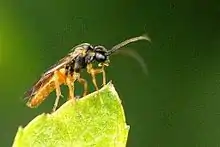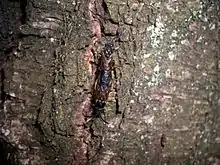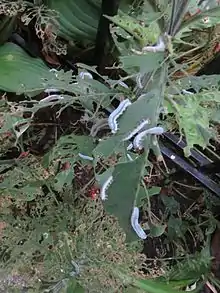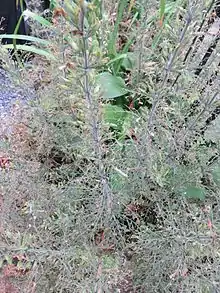Monostegia
Monostegia is a genus of sawfly. The authority is based on the description by Achille Costa and Oronzio Costa,[3] although earlier work grants this to Fabricius 1798.,[4] though the commonest species, M. abdominalis, bears the authority of Fabricius.
| Monostegia | |
|---|---|
 | |
| Monostegia abdominalis | |
| Scientific classification | |
| Kingdom: | |
| Phylum: | |
| Subphylum: | |
| Class: | |
| Order: | |
| Suborder: | |
| Superfamily: | |
| Family: | |
| Subfamily: | |
| Tribe: | |
| Genus: | Monostegia |
| Species | |
| |

Description
Adults: Head and thorax are black, with some yellow parts including mouthparts. Legs and abdomen mainly yellow, wings suffused with brown. Eggs: Smooth, white and oblong measuring 1 mm by 4 mm. Larvae: Caterpillar-like, growing from 2–4 mm to 16–21 mm. Pupae: Shorter and fatter measuring 8 mm in length, and become increasingly melanized.[5]
Taxonomy
Species often include only M. abdominalis but some authorities describe up to four species, including;[6][7][8]
Distribution
Distribution is holarctic, from Europe to Asia Minor and the Caucasus in the south, through to Siberia.[10] Though it was only introduced to North America from Europe in the 1950s, where it naturalised,[4] its range continues to expand. In 1979 its North American distribution was from Quebec to New Jersey, and west to Ontario[11] and Ohio[12] but was detected as far west as Washington state in 2016[13] in the United States and in Canada from Alberta[9] in the west to the Maritimes in the east.
Economic importance

Sawflys are folivore phytophages (plant eating). Monostegia's economic importance lies in the destructive habits of its caterpillar-like larvae which feed on the leaves of plants of the family Primulaceae, principally Lysimachia (such as yellow loosestrife, (Lysimachia terrestris)), and Anagallis (pimpernel).[10] Original reports in North America involved Lysimachia nummularia as the host plant, but L. terrestris was identified in the 1960s.[4]
Life cycle
Two (bivoltine) to three (multivoltine) generations per year occur, depending on the length of the summer season, with some larvae over wintering, otherwise the larvae mature in July, emerging from the soil as adults in August. Larvae that winter in the soil pupate in the spring to emerge in June.[4]
Adults are thelyotokous, females being produced from unfertilised eggs, and males are rare. The emerging female alights the underside of leaves at the top of the host plant, and contain 30–70 eggs, which they deposit over the space of about a week, and live for about a further week. the female penetrates the leaf with her ovipositor, depositing the eggs into the cavity, usually two at a time, moving from the distal leaf towards the stem, forming an egg cluster of between 6 and 16 eggs.[4]
The eggs are laid on the leaves of the host plant, and the immature larvae ( first instar) remain with the clusters of eggs for a day before dispersing and feeding on the underside of the leaves. One larva can consume a whole plant, migrating to a new plant after total defoliation. The mature larva (sixth instar) stops feeding and drops to the soil where it burrows and pupates.[4]


References
Bibliography
- Asaro, Christopher (2008-08-11). Sawflies (Hymenoptera: Symphyta). pp. 3250–3252. ISBN 9781402062421., in Capinera (2008)
- Benson, R.B. (5 September 1952). Handbooks for the identification of British insects: VI Hymenoptera 2 Symphyta Section (b) (PDF). Royal Entomological Society of London. p. 85. Archived from the original (PDF) on 24 September 2015.CS1 maint: ref=harv (link)
- Benson, Robert B (1962). "Holarctic sawflies (Hymenoptera : Symphyta)". Bulletin of the British Museum (Natural History). 12 (8): 390. Retrieved 7 September 2016.CS1 maint: ref=harv (link)
- Blank, S.M.; Schmidt, S.; Taeger, A., eds. (2006). Recent sawfly research synthesis and prospects. Keltern: Goecke und Evers. ISBN 3-937783-19-9.CS1 maint: ref=harv (link)
- Boevé, Jean-Luc (2008-08-11). Sawflies (Hymenoptera: Tenthredinidae). pp. 3252–3257. ISBN 9781402062421., in Capinera (2008)
- Capinera, John L., ed. (2008). Encyclopedia of Entomology (2nd ed.). Dordrecht: Springer. ISBN 978-1-4020-6242-1.CS1 maint: ref=harv (link)
- Costa, Oronzio Gabriele (1859). Fauna del regno di Napoli. Parte IIIa, Imenotteri, Tenthredinidea. Naples: Azzolino.CS1 maint: ref=harv (link)
- Blank, S.M.; Taeger, A. (1998). Comments on the taxonomy of Symphyta (Hymenoptera). pp. 141–174., in Taeger, A. & Blank, S. M. (eds.), Pflanzenwespen Deutschlands (Hymenoptera, Symphyta) Kommentierte Bestandsaufname. Deutsches Entomologisches Institut, Goecke& Evers, Keltern.
- Goulet, Henri; Huber, John T., eds. (1993). Hymenoptera of the world: An identification guide to families (PDF). Ottawa: Agriculture Canada. ISBN 0-660-14933-8. Archived from the original (PDF) on 2016-03-05.CS1 maint: ref=harv (link)
- Krombein, Karl V; Hurd, Paul V; Smith, David R; Burks, B D, eds. (1979). Catalog of hymenoptera in America north of Mexico. Washington DC: Smithsonian Institution Press.
- Liston, Andrew; Knight, Guy; Sheppard, David; Broad, Gavin; Livermore, Laurence (29 August 2014). "Checklist of British and Irish Hymenoptera - Sawflies, 'Symphyta'". Biodiversity Data Journal. 2 (2): e1168. doi:10.3897/BDJ.2.e1168. PMC 4152835. PMID 25197241.
- Looney, Chris; Smith, David R; Collman, Sharon J.; Langor, David W.; Peterson, Merrill A. (28 Apr 2016). "Sawflies (Hymenoptera, Symphyta) newly recorded from Washington State". Journal of Hymenoptera Research. 49: 129–159. doi:10.3897/JHR.49.7104.
- Price, Peter W. (April 1970). "A loosestrife sawfly, Monostegia abdominalis (Hymenoptera: Tenthredinidae)". The Canadian Entomologist. 102 (4): 491–495. doi:10.4039/Ent102491-4.CS1 maint: ref=harv (link)
- Skvarla, Michael; Smith, David; Fisher, Danielle; Dowling, Ashley (9 May 2016). "Terrestrial arthropods of Steel Creek, Buffalo National River, Arkansas. II. Sawflies (Insecta: Hymenoptera: " Symphyta ")". Biodiversity Data Journal. 4 (4): e8830. doi:10.3897/BDJ.4.e8830. PMC 4867044. PMID 27222635.
- Smith, David R (June 1979). Nearctic sawflies IV. Allantinae: Adults and larvae (Hymenoptera: Tenthredinidae) (Technical Bulletin 1595). Washington: US Department of Agriculture. Retrieved 30 August 2016.CS1 maint: ref=harv (link)
- Smith, David R. Symphyta, vol. i. pp. 1–137., in Krombein et al (1979)
- Taeger, Andreas; Blank, Stephan M; Liston, Andrew D. European Sawflies (Hymenoptera: Symphyta) - A Species Checklist for the Countries. pp. 399–504., in Blank, Schmidt & Taeger (2006)
Websites
- Blank, S.M.; Groll, E.K.; Liston, A.D.; Prous, M.; Taeger, A. (2012). "ECatSym - Electronic World Catalog of Symphyta (Insecta, Hymenoptera). Program version 4.0 beta, data version 39". Müncheberg: Digital Entomological Information.
- "Monostegia". Dyntaxa: Swedish taxonomic database. Swedish University of Agricultural Sciences. 2016. Retrieved 29 August 2016.
- "Monostegia". Fauna Europaea. 2015. Retrieved 29 August 2016.
- Blank, Stephan; Taeger, Andreas. "Monostegia". Fauna Europaea (Berlin). Berlin: Museum für Naturkunde.
- "Monostegia". BugGuide. Department of Entomology, Iowa State University. 2016. Retrieved 29 August 2016.
| Wikimedia Commons has media related to Monostegia. |